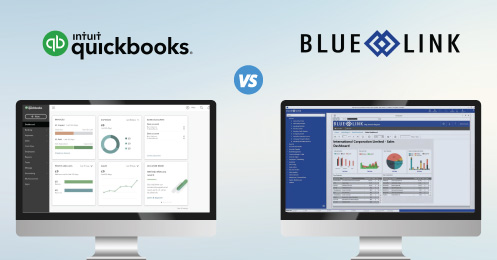Guest Post by Lisa C. Dunn
Cloud technology has certainly gained popularity over the last decade with more and more businesses moving away from traditional software models to the modern internet realm. However, many myths and misperceptions continue to surround Cloud-Based ERP (Enterprise Resource Planning) software.
For many businesses, it seems daunting to hop on the cloud-based bandwagon at first – especially if the company has been turning a blind eye to this transformative technology over the last few years. However, it’s definitely worth investing time to learn about it as cloud-based ERP represents a significant opportunity to your business, including affordability, scalability, and flexibility to grow.
So, what exactly is “the cloud”?
Cloud software, which is sometimes referred to as hosted or SaaS (Software as a Service), essentially stores information off-premises and at the vendor’s data center and the information is accessed via the cloud (or internet). The software itself physically lives on the vendor’s hardware. Users are able to access software and applications from anywhere in the world where they have an internet connection through an RDP connection installed on their local machine, VPN connection or via a web browser.
To help lift the fog, we dispel some of the biggest myths about cloud-based ERP and also offer insight to help you better understand the power of this revolutionary solution.
Myth 1: It’s Not Secure
In the initial days of cloud solutions and offerings, security was a main concern. The cloud was viewed as vulnerable to cyber-attacks since it can be accessed from anywhere in the world. However, those days are behind us.
Today, cloud-based ERP software is designed from the ground up with highly effective, powerful security measures in place. There are many security certifications and data center audits that safeguard the data you store in your ERP software. Ultimately, any data you store in the cloud is heavily secured – even more so than most on-site stored data.
Many small/medium businesses are not equipped with the proper level of disaster prevention systems, nor do they have the same level of safety measures in place at their different locations. The benefit of going the cloud-hosted software route is that if a disaster were to occur such as a fire or flood, your system would still be accessible and all your data would be safe in the vendor’s secure data center. Backup power generators, as well as state-of-the-art fire detection and suppression systems, are all imperative in data centers where servers are being managed. Depending on the vendor, there are several other security features such as levels of redundancy and automatic fail-over.
When it comes to data security, secure data centers will have multiple levels of security to enter the building such as biometric scanning, PIN code, access card and will also have 24/7 monitoring. Vendors also have provisions to encrypt data to protect sensitive business information from being accessed by outside parties.
Myth 2: It’s Harder to Use
Simply put- the majority of today’s cloud-based ERP software are more modern than their predecessors and have evolved to be extremely user-friendly.
Flexibility – Browser-based systems allow users to type in a URL and then enter login and password information to use software via a specific website. Connecting via RDP (remote desktop protocol) means users can access the system by logging in on various devices such as desktops, laptops, tablets, iPads etc. as long as there is an internet connection. With either way of connecting, you and your team members can share real-time information to make smart business decisions no matter where they are located.
Scalable - Cloud-based ERP systems allow you to share data more efficiently across multiple locations, divisions and departments. Since everyone on your team is interacting with centralized data via a common interface, the chances of misinterpreting the data between functions decreases and the opportunity for collaborative efforts rises. This also makes adding business locations or warehouses and connecting to ERP easy and quick.
Integrations - Integrating additional functionality to cloud-based ERP software is a great way to further optimize the automation of business processes. Be sure to go with a vendor that is able to integrate with third-party software such as credit card payment systems, payroll software, electronic document management platforms and eCommerce platforms to reduce manual processes.
Myth 3: It’s Difficult to Implement
Because cloud-based ERP requires no additional hardware, you don’t have to waste precious time procuring and installing IT infrastructure. With a cloud-based ERP solution, IT departments can roll out the system with ease across multiple regions and divisions, eliminating the high price tag often associated with these types of on-premises solutions. In addition, cloud ERP deployments typically take anywhere from three to six months to implement – compared to the full year that it can commonly take to roll out an on-premises solution. .
Myth 4: It Will Slow Us Down
Cloud-based ERP delivers better performance than on-site software solutions as its architecture is designed for maximum network performance, which translates to enhanced application availability.
It also offers optimized performance that can adapt to your company’s changing needs. For instance, if there is a spike in business, the technology automatically adjusts and provisions extra resources to handle the uptick in business.
Unlock the Benefits of Cloud-Based ERP
There’s no doubt that the conversation surrounding cloud-based ERP has changed substantially over the last several years.
Overcoming the myths and misconceptions regarding ERP systems and doing your homework in vendor selection can help your organization to land on solid ground to investing in the right solution for your needs.
Easier implementation, in conjunction with the enhanced capabilities of cloud applications and the ability to access the latest in functionality without expensive upgrades, all make a persuasive case for adoption.
Cloud-based ERP is evolving and growing by leaps and bounds. Considering its progression, it is clear that this software is vital to today’s business landscape, from small-to-medium enterprises to global multinational companies.
Lisa C. Dunn is a writer for TechnologyAdvice and a freelance writer, copywriter and ghostwriter who develops high-quality content for businesses and non-profit organizations. For over 20 years, she has worked with numerous PR and digital marketing agencies, and her work has been featured in well-known publications including Forbes, VentureBeat, Mashable, Huffington Post, Wired, B2C, USA Today, among others.











